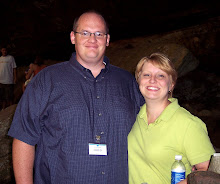In Matthew 18, Jesus asks his disciples, "Who is the greatest in the kingdom of heaven?" There's no record of a response, probably because that very issue landed them in hot water on more than one occasion. Jesus answered his own question when he said, "I tell you the truth, unless you change and become like little children, you will never enter the kingdom of heaven. Therefore whoever humbles himself like this little child is the greatest in the kingdom of heaven."
Scholars have bantered about numerous ideas concerning what it means to become like a little child; I'm sure there's more than one possible answer. But I was reminded the other day of one aspect of being child-like. We were out with a friend who was holding Jake's hand walking through a store. One of the women who worked there struck up a conversation with him and he politely answered all her questions. She said to him, "wow, are you always this good?" My friend started making some kind remarks about how nice he was and Jake interrupted with a vigorous head shake and a very clear, "No."
He was telling the truth. Even though it didn't put him in the best possible light, he just came right out with it. He didn't have the sophistication to think about how to answer the question in a way that would make him look as good as possible. He didn't think for a moment that his answer might cause him to be loved less. He just said what he knew to be true.
There's a lesson in there somewhere. How many times do I say or do something to make myself look better than I really am? How many times am I afraid that to be honest about my brokenness would make me less loved? How many times do I choose a higher status in the kingdom of men rather than the kingdom of heaven? I want to be a truth teller, and so, somehow, grow up to be a child, perfectly at home being loved and blessed by Jesus in the kingdom of heaven.
Friday, May 30, 2008
Subscribe to:
Post Comments (Atom)

1 comment:
It is so true that we try to hide our brokeness from each other in order to not feel vulnerable. I read a book called From Brokeness to Community by a French-Canadian priest named Jean Vanier. In his ministry with disabled people left in asylums or hospitals by their families, he discovered that when we learn to accept and admit our brokeness to others we begin the process of healing. We learn to love each otehr in our brokeness; when we are able to admit our own weaknesses we learn to accept each other regardless of another's faults. And in this state it is possible to build true community.
Post a Comment